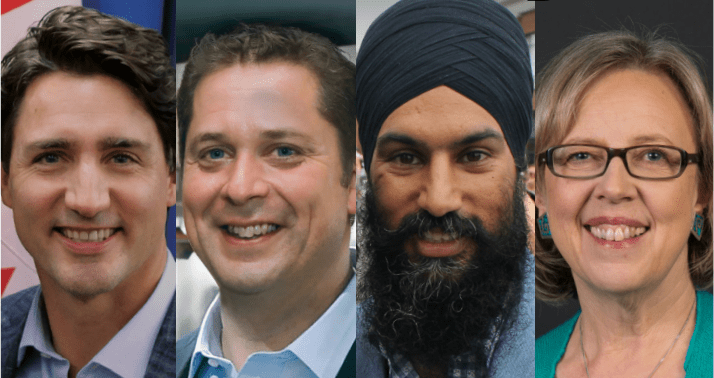So Far, so (Relatively) Sane

Lisa Van Dusen/The Hill Times
Sept. 18, 2019
With the disclaimer that these days, the 48 hours between filing and press time can produce a multitude of dumpster fires, our federal election actually seems pretty normal so far.
At the one-week mark of Canada’s 43rd federal election campaign, we seem to have mercifully dodged the sort of outrageousness that has stalked elections in other democracies. Nobody has proposed a minimum height requirement for immigrants, vowed to annex St-Pierre et Miquelon or threatened to pull Canada out of NATO.
The preliminary take-aways seem to be the following: Prime Minister Justin Trudeau is channeling pre-prime minister Justin Trudeau; Andrew Scheer’s retail game may not be what nobody really thought it would be; Jagmeet Singh’s retail game is better than most people thought it would be; and Elizabeth May must be doing something right.
The fact that Trudeau’s stump speech cannily leverages the shrunken attention spans of our click-addled brains by reclaiming the underdog tone that helped him beat Stephen Harper in 2015 makes total sense, though it may be both more timely and more pertinent for him to run against the politics of Donald Trump than the politics of Stephen Harper.
Scheer’s job in this campaign was not to try to out-charisma Trudeau, but to make his own lack of charisma an asset: to be the Dockers to Trudeau’s Star Wars socks, the Ovaltine to Trudeau’s Red Bull … when he goes hot, I go lukewarm, because sometimes lukewarm is what you want in a leader. Sure, it was always going to be a slog, but nobody expected him to be doing the slogging post wheels-up as a sort of real-time, live, interactive optics experiment. It’s a performance issue that, barring a correction, will not only benefit Trudeau, but could also rationalize a dark horse/Trumpian disruption scenario on the right if Maxime Bernier—the Borisonian wild card of the piece and, so far, the ominous dog that didn’t bark—siphons off disenchanted alt-righters already underwhelmed by Scheer’s froth deficiency.
Singh, whose absence from the House of Commons for most of the time since he succeeded Tom Mulcair as NDP leader made him a somewhat unknown quantity at the national level, has parlayed those fuzzy expectations into the pleasant surprise of a guy who says what he thinks, whenever he thinks it—about special interests, about climate change, about inequality, about poverty, and other issues that these days are less ideological than economically and existentially imperative.
At a time when political warfare in politics can take deceptively stratified forms, Elizabeth May’s first week—with a separatist eruption in Quebec and an anti-abortionist eruption in Ontario that raised the sort of vetting controversy you don’t usually see until at least week two—was a reminder that the same qualities of trust and guilelessness that made her Canada’s quixotic political sweetheart may not serve her as well in the tougher terrain of double-digit territory.
Overarching the horse race is the fact that, these days—between the unified content sphere and the borderless tension between democracy and its detractors—all politics are global. Which means that, because Trudeau occupies a very specific space in the fight over the future of the liberal, rules-based international order, he’s more of a target for the sort of covert narrative hijinks that have influenced electoral outcomes elsewhere.
That dynamic is most likely to play out in the hyper-tactical battlefield of the social media and analysis echo chamber, where story lines get propagated whether they reflect organic reality or not, where vested interests aren’t spelled out on name tags, and where there exists a percentage of energy devoted not just to partisan or corporate gain but to the new currency of making democracy look as preposterous, off-putting, and chaotic as possible.
But at filing time, a 48-hour eternity ago, things were relatively quiet. Fingers crossed.
Lisa Van Dusen is associate editor of Policy Magazine and a columnist for The Hill Times. She was Washington bureau chief for Sun Media, a writer for Peter Jennings at ABC News, and an editor at AP in New York and UPI in Washington.
